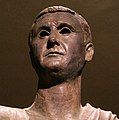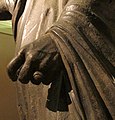| Revision as of 06:20, 11 May 2015 editCarlotm (talk | contribs)Extended confirmed users4,372 edits Carlotm moved page The Orator to The Orator (film): There is a more importamt "The Orator" | Revision as of 04:59, 24 May 2015 edit undoCarlotm (talk | contribs)Extended confirmed users4,372 edits Moved content from "Aule Metele" pageNext edit → | ||
| Line 1: | Line 1: | ||
| {{unreferenced|date=September 2012}} | |||
| #REDIRECT ] | |||
| {{R from move}} | |||
| {{Sculpture | |||
| |image = ] | |||
| |Title = Aule Metele (The Orator) | |||
| |year = c. 100 BCE | |||
| |work = sculpture | |||
| |material = bronze | |||
| |height_metric = 179 | |||
| |metric_unit=cm | |||
| |imperial_unit=in | |||
| |city = ] | |||
| |museum = ] | |||
| }} | |||
| '''Aule Metele''', ]: '''''Aulus Metellus'''''; also known as '''''The Orator''''', ]: '''''L'Arringatore''''', is a bronze sculpture 179 cm high.<ref name="Bonfante1986">{{cite book|author=Larissa Bonfante|title=Etruscan Life and Afterlife: A Handbook of Etruscan Studies|url=http://books.google.com/books?id=4QaXZky58FIC&pg=PA139|year=1986|publisher=Wayne State University Press|isbn=0-8143-1813-4|pages=139–}}</ref> It is a Romano-Etruscan work from the late second century or early first century BCE in the Roman style and depicts an Etruscan man, Aule Metele, wearing a short Roman ] and footwear. His right arm is raised to indicate that he is an ] addressing the public.<ref name="JansonJanson2004">{{cite book|author1=Horst Woldemar Janson|author2=Anthony F. Janson|title=History of Art: The Western Tradition|url=http://books.google.com/books?id=MMYHuvhWBH4C&pg=PT190|year=2004|publisher=Prentice Hall Professional|isbn=978-0-13-182895-7|pages=190–}}</ref> | |||
| The retrograde inscription is in the ] reads: : “auleśi meteliś ve vesial clenśi / cen flereś tece sanśl tenine / tu θineś χisvlicś” (“To (or from) Auli Meteli, the son of Vel and Vesi, Tenine (?) set up this statue as a votive offering to Sans, by deliberation of the people”).<ref>'']'' 651; '']'' 4196</ref><ref name="Wylin2000">{{cite book|author=Koen Wylin|title=Il verbo etrusco: ricerca morfosintattica delle forme usate in funzione verbale|url=http://books.google.com/books?id=Wu7VO7RzgwcC&pg=PA112|year=2000|publisher=L'ERMA di BRETSCHNEIDER|isbn=978-88-8265-084-1|pages=112–}}</ref> | |||
| <gallery> | |||
| File:L'Arringatore2.jpg|Detail of inscription | |||
| File:Arringatore 14 iscrizione.JPG|Detail of inscription | |||
| File:Arringatore 12.JPG|Detail of head | |||
| File:Arringatore 13.JPG|Detail of left hand | |||
| </gallery> | |||
| ==References== | |||
| {{reflist}} | |||
| ] | |||
| ] | |||
| ] | |||
| {{sculpture-stub}} | |||
Revision as of 04:59, 24 May 2015
| This article does not cite any sources. Please help improve this article by adding citations to reliable sources. Unsourced material may be challenged and removed. Find sources: "The Orator" – news · newspapers · books · scholar · JSTOR (September 2012) (Learn how and when to remove this message) |
| The Orator | |
|---|---|
 | |
| Year | c. 100 BCE |
| Medium | bronze |
| Dimensions | 179 cm (70 in) |
| Location | National Archaeological Museum, Florence |
Aule Metele, Latin: Aulus Metellus; also known as The Orator, Italian: L'Arringatore, is a bronze sculpture 179 cm high. It is a Romano-Etruscan work from the late second century or early first century BCE in the Roman style and depicts an Etruscan man, Aule Metele, wearing a short Roman toga and footwear. His right arm is raised to indicate that he is an orator addressing the public.
The retrograde inscription is in the Etruscan alphabet reads: : “auleśi meteliś ve vesial clenśi / cen flereś tece sanśl tenine / tu θineś χisvlicś” (“To (or from) Auli Meteli, the son of Vel and Vesi, Tenine (?) set up this statue as a votive offering to Sans, by deliberation of the people”).
References
- Larissa Bonfante (1986). Etruscan Life and Afterlife: A Handbook of Etruscan Studies. Wayne State University Press. pp. 139–. ISBN 0-8143-1813-4.
- Horst Woldemar Janson; Anthony F. Janson (2004). History of Art: The Western Tradition. Prentice Hall Professional. pp. 190–. ISBN 978-0-13-182895-7.
- TLE 651; CIE 4196
- Koen Wylin (2000). Il verbo etrusco: ricerca morfosintattica delle forme usate in funzione verbale. L'ERMA di BRETSCHNEIDER. pp. 112–. ISBN 978-88-8265-084-1.
This sculpture article is a stub. You can help Misplaced Pages by expanding it. |



